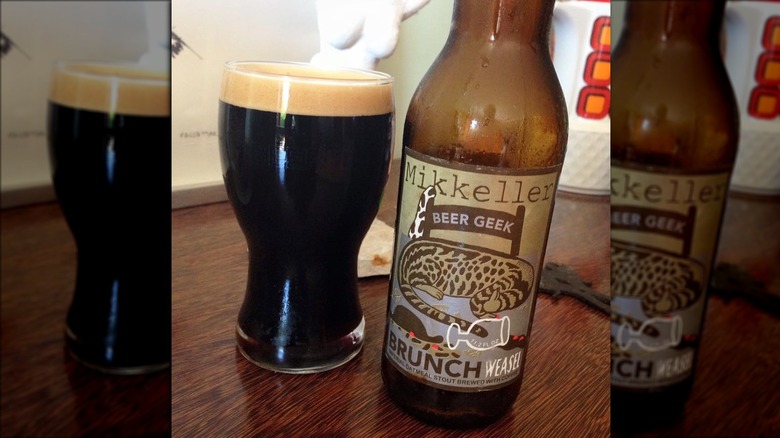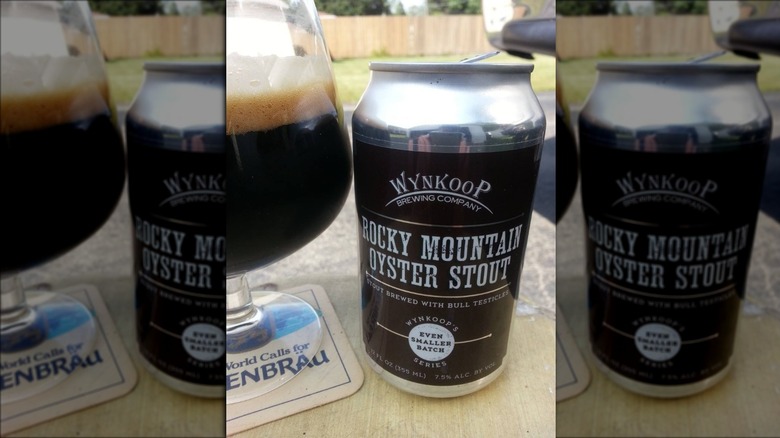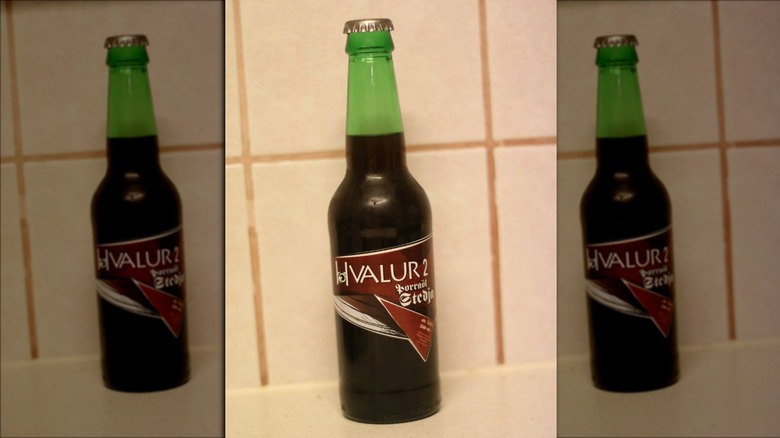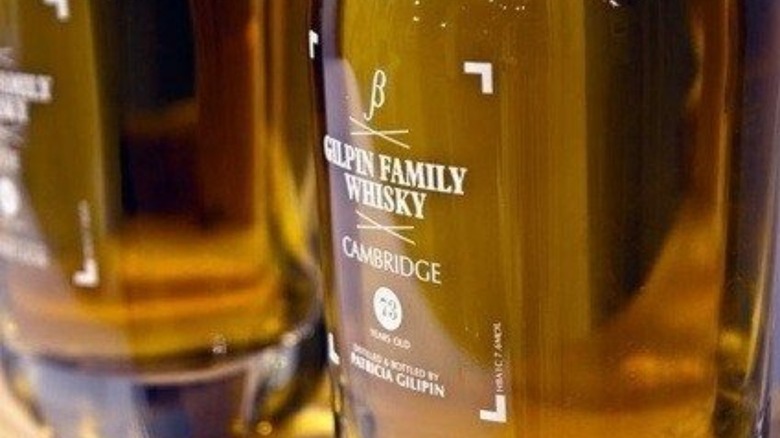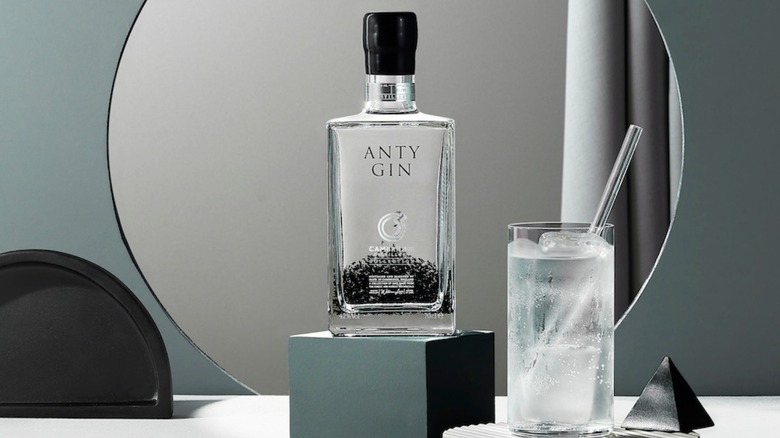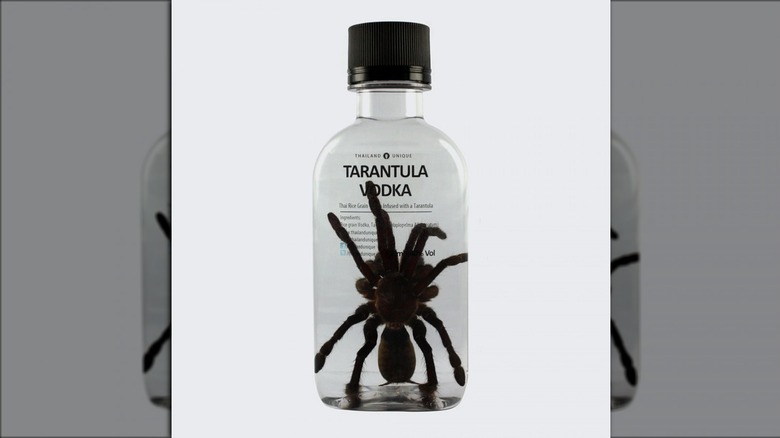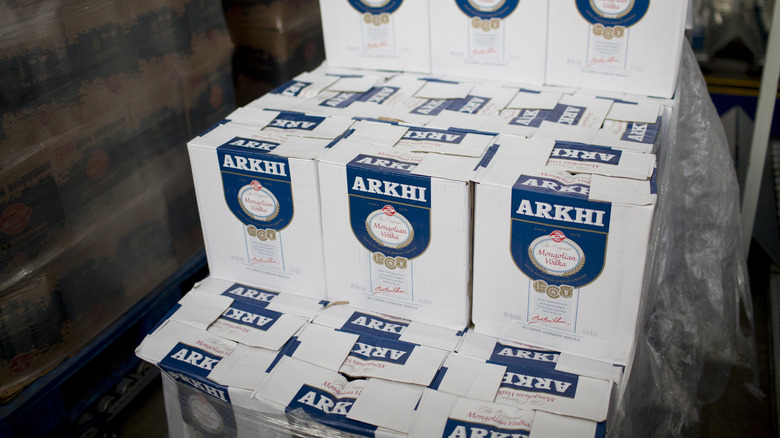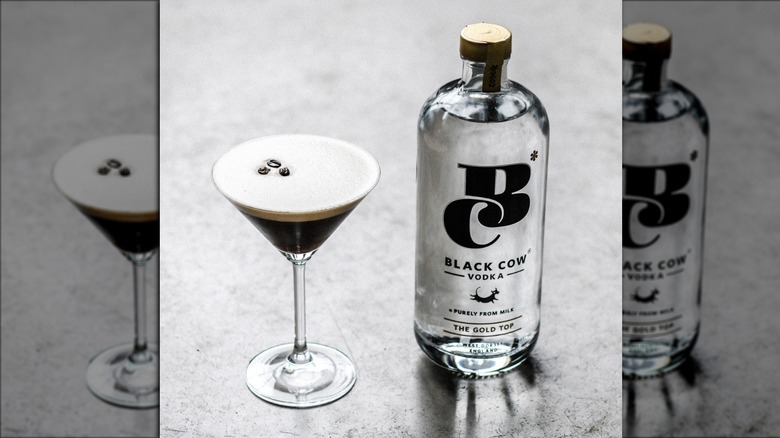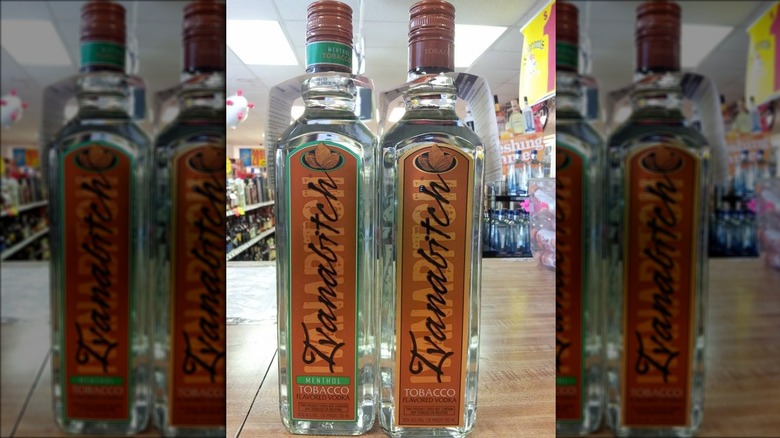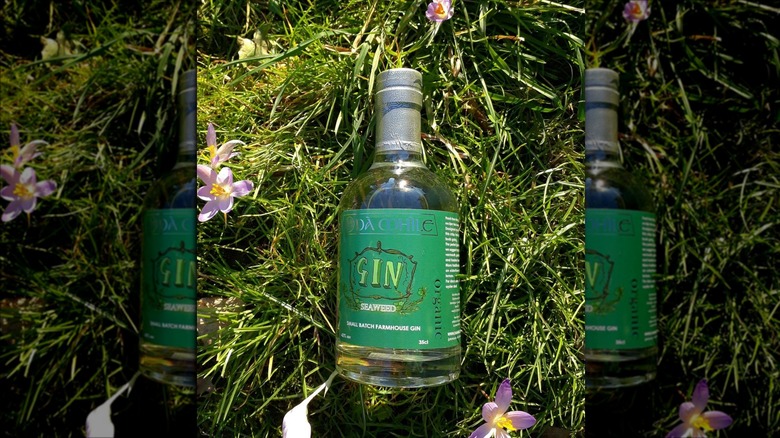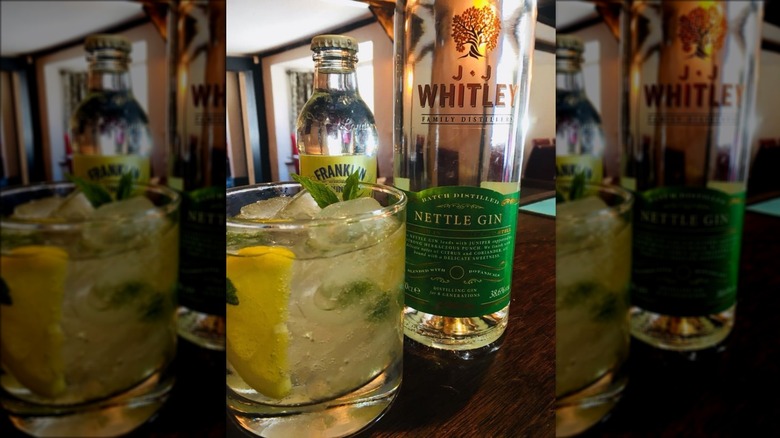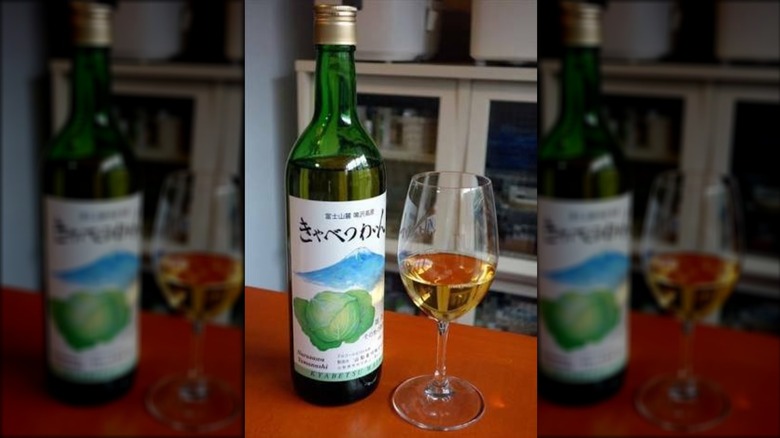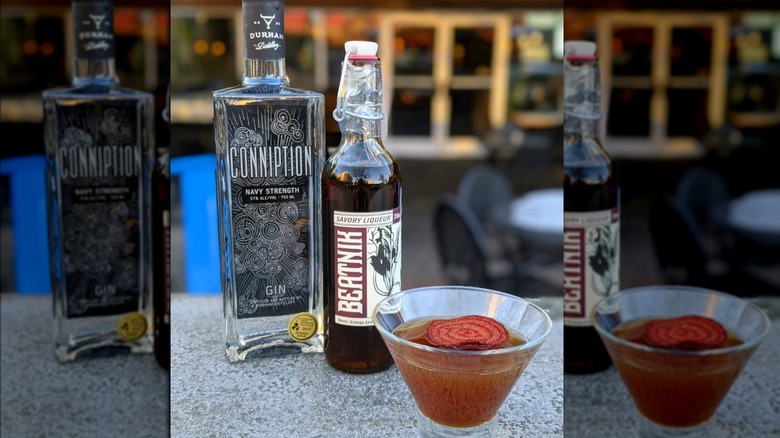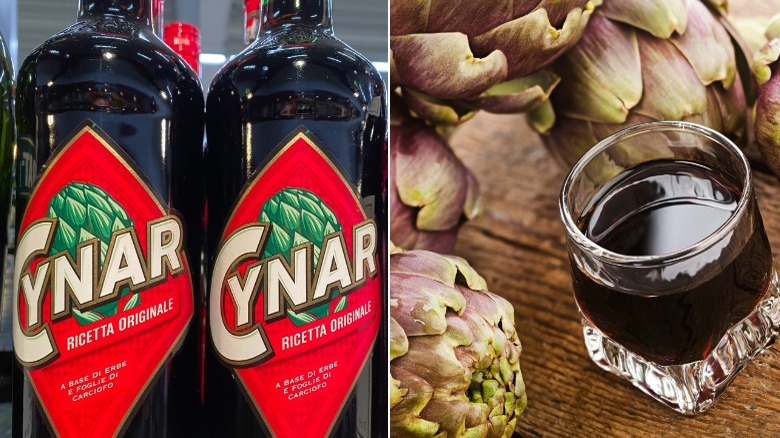These May Be The World's Most Unusual Booze Brands
We may receive a commission on purchases made from links.
Alcoholic beverages of any sort tend to be an acquired taste, for the most part. One reason they're known as adult beverages may be that not only must you be legally an adult in order to consume them, but beer, wine, and liquors have a flavor that's entirely lacking in kid appeal (and a good thing, too).
Popular alcoholic beverages tend to run the gamut from uber-bitter American IPAs to super-sweet liqueurs and cream drinks, and one person's tipple may well be another person's "blechh!" Unpopular ones, however, tend to be so for a good reason. Many of the beverages on this list are made with ingredients that some may find off-putting (insects, bovine reproductive organs, recycled bodily fluids), while others are simply made with material that just doesn't seem to lend itself well to boozification (vegetables, dairy products). As we have not sampled these often hard-to-source beverages, we are neither endorsing nor condemning any of them, merely noting that they are ... well, not the kind of thing most of us are likely to find offered by our corner watering holes.
1. Beer Geek Brunch Weasel
While you might think that Beer Geek Brunch Weasel is just another quirky/cute name for a craft beer, it's actually not brewed by bearded Portland hipsters but by the Danish-based Mikkeller. That's not what makes it out-of-the-ordinary, however, as Denmark is home to many fine breweries. No, it's the "weasel" part of the name that hints at this beer's, um, out-of-the-(litter)box origins. It is made with coffee — again, nothing strange there — but the coffee used here is cà phê Chồn, also commonly called kopi luwak. Yes, that's right. It's that stuff that comes from coffee cherries that have first passed through the digestive tract of a weasel-like beastie called a civet cat.
So how drinkable is this weasel poop beer, and can you try it for yourself? To answer the second question first, the answer is a definite maybe, as Drizly does carry it, but it appears to be unavailable in certain markets at present. As to whether you would want to try it, consensus amongst RateBeer users appears to be that yes, it's actually pretty decent stuff. One person calls it "very sensual," praising its "excellent rich coffee flavors balanced well with the oatmeal body," while another calls it "reminiscent of a mocha/choc dessert." Unbelievably (to us), not a single poop joke was made, at least not in English. Ha. Well, we feel we just wouldn't be doing our "doody" if we didn't stoop to that level ourselves.
2. Wynkoop Rocky Mountain Oyster Stout
If you are not familiar with the delicacy known as the Rocky Mountain Oyster, well, the name is somewhat misleading. While the item in question may (or may not) originate in the Rocky Mountain region, it's no kind of shellfish. In fact, the "oyster" in question is a euphemism for a bull's personal parts, the ones he loses when he undergoes a certain medical procedure that turns him into a steer. And yes, the Rocky Mountain Oyster Stout from Denver's Wynkoop Brewery is made with its eponymous ingredient.
According to the Burlington Record, it takes six roasted bull bits to make each barrel of the beer, and -– good news for Colorado's bull population -– it's an extremely limited edition that only comes out every few years. While it was initially available in Denver-area stores in 2-packs, it seems it may now only be available in Wynkoop's tap room. At 9.1% ABV, it seems the most recent release of Rocky Mountain Oyster Stout is, ahem, a rather ballsy brew. As to the flavor, one Beer Advocate user says "I can't say that I can taste the testicles that are brewed into this beer but it's still a pretty good stout."
3. Stedji Hvalur 2
Can't decide between a beer made with a poop byproduct and one that contains testicles? No need to flip a coin! The Icelandic beer called Hvalur 2 is made with, as per Brugghus Stedja's website, "sheep-sh** smoked whale testicle." If you want something a little more on-trend, though, they also offer a sour, Lambic-style beer called Surhvalur that is made with kombucha-cured whale testicles instead. ("Just as ballsy, but not so sh***ty" would make a good advertising slogan. You're welcome, Stedji).
The really iffy thing about this beer, which is only available in Iceland, is the fact that the unlucky cetaceans who involuntarily donate their testicles are fin whales, a species that NOAA Fisheries classifies as endangered. As to the taste, Chicago Beer Geeks found a 2016 batch of Hvalur 2 to be "intense," with a heavy, smoky flavor, but one 2017 Beer Advocate review described the beer as "excessively bland ... lacking any substance to it."
4. Gilpin Family Whiskey
You may aspire to having a zero-waste kitchen, which is a commendable ambition, indeed. But have you ever thought about having a zero-waste bathroom? Probably not, since for most of us, when it comes to bodily waste, we'd rather just flush and forget. It is possible, however, to recycle such matter into both fertilizer and fuel -– and, in the case of Gilpin Family Whiskey, into something a bit more spirited, or rather, spirituous.
Gilpin Family Whiskey is the brainchild of James Gilpin, art school graduate, maker, teacher, and diabetic. According to Wired, he realized that diabetic urine has high sugar levels, something that makes it a good candidate for distillation. While Gilpin never intended to market the whiskey he produced from this biological byproduct, he did exhibit it at a U.K. art show in 2018 in order to draw attention to the potential for recycling one of the world's most sustainable resources. As a part of the exhibit, however, people were able to taste the whiskey. They must have liked it ok, since by the following year at least one pub –- the The Cross Keys Inn of Wootton Bassett -– was stocking it in their bar.
5. Anty Gin
Another natural resource that the world isn't likely to run short of anytime soon is insects. While certain species may be endangered, the Smithsonian estimates that at any given time the world is quite literally crawling with some 10 quintillion bugs. (No, this is not a made-up number –- a quintillion is a 1 followed by 18 0s). Among the many, many (many, many, many ...) non-endangered insects out there are the red wood ants, aka formica rufa. Cambridge University Press says that this species is fairly common just about everywhere in the northern hemisphere, and you may spot a few at your next picnic. Seeing as how a few of these ants can surely be spared without upsetting anyone but the most rabid of insect rights activists, Cambridge Distillery decided to take them and make them into Anty Gin.
Anty Gin, as their website boasts, is "the world's first insect-based gin," and of that, we have no doubt. As to what gave the distillers the idea, they say that the formic acid that wood ants contain has a citrusy kind of taste that they thought would go well with other botanicals often used in gin. So how does it taste? According to The Gin Is In, not as terrible as you might expect. While they did detect an "initial unusual note" that they said was "slightly vinegary," their final verdict was that "Anty Gin ultimately underwhelms as a merely 'very expensive' classic style gin."
6. Insect-infused vodkas
If Anty Gin claims to be the first gin made of insects, does that mean there are other bug-based boozes? While we're not sure whether insects have been used to distill other alcoholic beverages, they have certainly been used to infuse them. While we're all familiar with the worm at the bottom of certain mezcal bottles, an importer called Thailand Unique lives up to the latter part of its name by offering a line of vodkas infused with some larger, leggier creepy crawlies.
While Thailand Unique claims to offer insect-infused wines, whiskeys, and vodkas, the website currently features only vodka in the following "flavors": scorpion, black scorpion, centipede, longhorn beetle, spider, and tarantula (at the risk of seeming pedantic, we'll point out that the majority of the creatures in that list are arachnids rather than insects). It appears that only the 50-milliliter bottle of scorpion vodka is available for purchase at the time of writing, but if you want to create your own infusions, Thailand Unique also offers dried, food-grade insects (and arachnids) that you can buy in bulk.
7. Arkhi Vodka
Once upon a time in ancient Mongolia, the nomadic horse tribes began fermenting mares' milk to make a drink called airag, a product similar to the drink we know as kefir. At some point, they started taking this fermented mares' milk and distilling it to make a stronger drink known as arkhi. We can't say for sure when this bev-olution took place, but most likely some time after their Russian neighbors started making vodka around 700 or more years ago. While Happy Hour City says that arkhi is the type of drink you're most likely to be introduced to should you get a private invite to visit someone's yurt, this is the 21st century, and of course some commercial distillers have started producing the stuff.
According to Wine Style Online, one such brand, simply called Arkhi, bills itself as a Mongolian vodka and is a product of the APU Company. The drink is said to have a whey-like flavor, or else to taste like honey-flavored skim milk. The one thing we don't know, however, is whether the milk that goes into this drink comes from mares, cows, or some other beastie. The APU website might have more information to offer, but the website's English translation feature was somewhat limited in scope –- which would also be a more than generous way to describe our own knowledge of the Mongolian language.
8. Black Cow Vodka
Black Cow Vodka may not sound particularly unusual, nor, from a quick glance at the label, would you necessarily think this is anything out of the ordinary. If you read the fine print, however, you'll find that Black Cow is basically the U.K.'s answer to Arkhi –- except that, in this case, we definitely do know what animal supplied the milk from which it was distilled. Black Cow does credit the Mongolians for coming up with the milk-into-booze idea first, although they specifically name-drop Genghis Khan as the inventor of a product that had actually been around for a few millennia before he was even born.
Black Cow vodka is actually a byproduct of the cheese-making process. The same people who make it also produce cheddar cheese, and it seems they used to sell the leftover whey to pig farmers since the stuff is fine for swine. There isn't a fortune to be made by selling pig food, however, so they came up with the more lucrative idea of distilling it, instead. According to Vodka Guy, it's a good thing they did, since the stuff's pretty darn amazing! Maybe it'll catch on with all the cheese makers and this type of vodka will be the "whey-ve" of the future!
9. Ivanabitch Tobacco/Menthol Tobacco Vodka
While "Ivanabitch" might sound like a joke brand put out in 2017 by someone who was no fan of the then-POTUS, or at least his ex-wife, it's actually a Dutch brand. The brand's slogan is "vodka with attitude," but most of their lineup consists of pretty standard flavored vodkas: cherry, blackberry, peach, coconut, vanilla, etc. They do have two real oddball ones, though, meant to appeal to ... we're not quite sure. Gag gifters? The easily amused? Definitely not vodka connoisseurs, though. According to Drinkhacker, both the tobacco and menthol tobacco flavors are about as good as you'd expect — which is to say, not good at all.
The fact that everyone who's reviewed these tobacco vodkas has lived to type the tale tells us that they are not distilled from real tobacco, since as anyone who's up on their Agatha Christie knows, tobacco can be a deadly poison if ingested. (It's not all that great if you stick to smoking it, either, but in that case it at least takes a few years to kill you). Whatever they use to flavor it, the tobacco vodka alone is something that Drinkhacker says manages to be sickeningly sweet with a " funky, sweaty, indescribable finish." They don't feel the menthol is much of an improvement, tasting as it does of "vanilla and Sweet-N-Low ... with a vague peppermint character."
10. Dà Mhìle Organic Seaweed Gin
Roasted seaweed, especially the wasabi-flavored kind, actually makes for a pretty good snack, and seaweed sheets, aka nori, are an essential part of every sushi roll. We have nothing whatsoever against seaweed as a foodstuff, and in fact tend to be in the pro-seaweed camp. Using the stuff as a booze flavoring, though ... well, we can't knock it, since, as per our previous admission, we haven't ever tried it. Still, seaweed-flavored gin sounds like something that might take a bit of getting used to.
Dà Mhìle Organic Seaweed Gin is a product that its makers said was intended to be served with seafood. Seaweed, seafood, that checks out. Also, it stands to reason that they'd have plenty of seafood to experiment with in Wales, as there's nowhere in the British Isles that's all that far from the ocean, what with them being "isles" and all. While this product appears to be surprisingly popular -– it has a 4.6 star rating on Amazon UK -– not everyone is a fan. While one reviewer (who loves the stuff) admits it's "completely different from any other gin you have ever tasted before," another, not such a fan, says when you use it in a G&T it tastes "like the tide was out or slightly like a sewer."
11. J.J. Whitley Nettle Gin
Nettles are a plant that some consider a delicacy, but we've always thought of them as something more fit for goats. No matter how delicate the flavor, they're just too associated in our minds with painful experiences, the kind requiring ice packs and calamine lotion. Still, it must be pretty safe to drink a gin that's distilled from nettles, mustn't it? Apparently so, as it rates quite highly with Masters of Malt.
Masters of Malt admitted that nettle-flavored gin isn't something you see every day, and said they were "rather intrigued" by the concept, but they tried it and they liked it. They characterized it as "massively herbaceous," which is evidently a good thing, gin-wise (though it would be pretty weird for a whiskey), and found flavor notes of basil, coriander, juniper, citrus peel, and "forest floor." (Does this mean dirt? Or is it just some obscure gin-tasting terminology? Someone help us out here). The site's amateur reviewers, however, expressed their opinions in words we can understand. They said J.J. Whitley Nettle Gin was "light and refreshing," "fantastically smooth," and "absolutely delicious." As one satisfied drinker advised, "Don't be put off by the main botanical, be prepared to be very pleasantly surprised!"
12. Narusawa Cabbage Wine
Did you know Japan has a wine region? Well, they do -– according to Japan Today, the Yamanashi Prefecture is where all the best Japanese wine grapes are grown. In Narusawa Town, however, they are famous for a different product: wine made from cabbages. Actually, the wine is only about 60% cabbage, with the other 40% being grapes, but it's still, well, much cabbagier than any other drink we've encountered. It seems that the wine has been produced for the past few decades as a way to use up any surplus cabbages that may be lying around.
Apparently there's not a huge export market for cabbage wine, so as far as we're aware, you can still only purchase it in Narusawa itself. Reviews are also pretty hard to come by, at least in English, but KCP International Japanese Language school describes the flavor as sweet but with a noticeable cabbage taste. While none of the commenters on the JT article had tried the stuff — and not too many were interested in doing so — more than a few of them offered up a comment on the malodorous emissions that they assumed would be the byproduct of such a cabbage-based beverage.
13. Beatnik Liqueur
Beets are a vegetable that, for many people, have long been synonymous with "yuck." They finally got their due in the 20-teens (the Los Angeles Times says it was 2016), being hailed for their health benefits and subsequently given a hipster foodie makeover. By now every trendy bistro has its roast beet salad and caramelized beet puree, and everyone at least pretends to love this now-popular root veggie. Still, is the world prepared for a beet-flavored liqueur? Ready or not, it's already got one.
Beatnik Liqueur is made by the Brothers Vilgalys, a distillery that specializes in what they call "Baltic-style spirits." The beet-flavored Beatnik dates to 2015, which puts the Baltic brothers slightly ahead of the trend, but trendy or not, they admit this beet liqueur is "an eccentric oddball" that will "not be for everyone." You think? Still, Beatnik's not pure essence de beet, as they also use fennel and orange peel to flavor it, along with some rosemary, sage, and thyme (no parsley, though — sorry, Simon and Garfunkel fans). So how does it taste? Reviews are few and far between for this still-obscure liqueur, but Captain Cocktails describes it as having "great sweet, earthy taste that lends itself well to some fall cocktails," while the beet-loving blogger at a-single-serving.com says it has "a fantastic taste ... lovely earthy, beety, resiny, woodsy." If you're a big beet fan, you may enjoy this one. If not, well, Beatnik may not make a convert out of you.
14. Cynar
Cynar is an Italian liqueur that is produced by the same folks that bring us Campari, but a quick skim through a cocktail guide seems to show that it's the less-popular sibling in the Campari family. Difford's Guide, for one, lists a grand total of 210 drinks made with Campari, including the classic negroni, while Cynar is only used in 57 drinks, none of which we'd ever heard of. (We do like the sound of the Artichoke Hold, Bitter Giuseppe, and Eeyore's Requiem, though, and really hope they catch on). Still, 57 isn't bad, considering Cynar's main ingredient: artichokes.
Yep, really, someone thought to make a liqueur, or rather, an aperitif, out of artichokes. In fact, Cynar's been around since 1952, so apparently people have been buying it, too. So what does it taste like? DrinkHacker says it's not too terribly artichokey, although it is fairly "vegetal" and very, very bitter, They also detected notes of cinnamon, quinine, and root beer, and rendered a verdict that overall, Cynar is "not quite refreshing," but is "at least a perfect palate cleanser." So there you go –- if you never feel your palate is quite clean enough, and/or you really want to boost your artichoke intake, this may be the drink for you.

